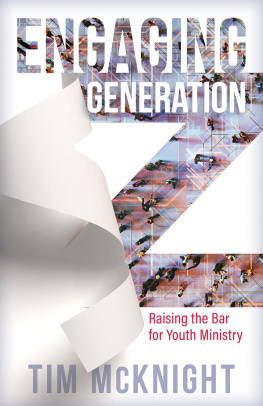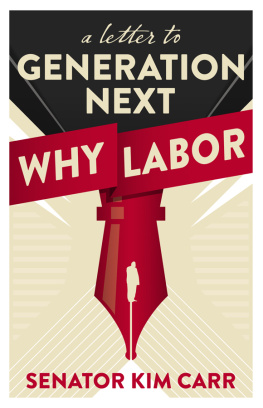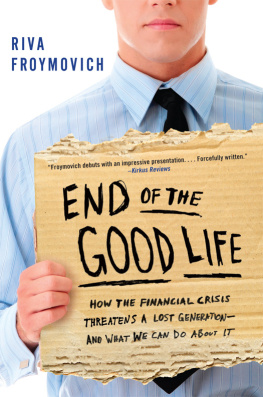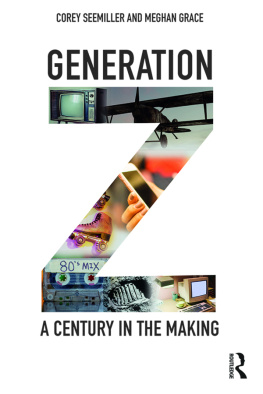
Praise for the first edition of Jilted Generation
What the authors eloquently trace is the consequences of a breathtakingly foolhardy thirty-year experiment in dismantling the state and individualising responsibility that has led straight to the debt crisis we face today. We should applaud their forensic skill in exposing the rarely discussed assumptions that have led us to where we are, and in setting out the consequences in concrete terms. The Oldie
Jilted Generation brilliantly analyses the problems faced by todays generation of young adults. Scotsman
Howker and Malik knit together a taut and analytically rigorous narrative of 25 years of political myopia and mismanagement, outlining a series of gross policy errors that have disproportionately benefited the old at the expense of the young. These mistakes are likely to loom large over the UK for decades. The Spectator
No parent can dismiss this argument about our collective failure to invest in the future. The Guardian
An excellent analysis of the hardship and inequity faced by todays generation of young people. Morning Star
Ed Howker and Shiv Malik have written a critique of capitalism that is as powerful and provocative as anything written by Marx and Engels. Tribune
A heady cocktail thats enough to make anyones blood boil. At times the writers become true polemicists a compelling narrative that explains exactly how serial ministers focus on individuals as self-interested and motivated purely by money has influenced our politics. Politics.co.uk
The run-up to the election saw a string of books on intergenerational unfairness The best was Jilted Generation by Ed Howker and Shiv Malik. They did not confine themselves to education but looked at how children were having their rites of passage to adulthood postponed, and how vast numbers were living with their parents into their twenties. They could not afford exorbitant housing costs, or build a career because they worked in exploitative internships or insecure temporary jobs, if they worked at all. Nick Cohen, The Observer
They do not hold babyboomers responsible for the misfortunes of the current generation. They develop a more interesting line of argument Howker and Malik want politicians to engage in more long-term thinking about the problems of society, but one of the obstacles is this culture of self-expression and immediate gratification, which is now a key part of the way the economy and politics work. Reversing this lies at the heart of the contemporary political dilemma. Times Literary Supplement
Most political books are dated even by publication, but the Malik/Howker Jilted Generation argument just gets stronger by the day. The Max Dunbar blog

Revised printed edition published in the UK in 2013 by
Icon Books Ltd, Omnibus Business Centre,
3941 North Road, London N7 9DP
email:
www.iconbooks.net
Original printed edition published in the UK in 2010
by Icon Books Ltd
This updated electronic edition published in 2013
by Icon Books Ltd
ISBN: 978-184831-624-9 (ePub format)
Text copyright 2010, 2013 Ed Howker and Shiv Malik
The authors have asserted their moral rights.
No part of this book may be reproduced in any form, or by any means, without prior permission in writing from the publisher.
Typesetting by Marie Doherty
CONTENTS
About the authors
Ed Howker is an investigative journalist on Channel 4s Dispatches programme. Shiv Malik is a staff writer on The Guardian newspaper. They co-founded The Intergenerational Foundation in 2011 and are in their early 30s.
To our parents, thank you.
PREFACE TO THE NEW EDITION
We are sometimes tempted to think that history repeats itself, that one government is just like the last, that one generation is just like the one that came before it, that nothing really changes. But history moves in mysterious ways.
Most mysterious of all is the plight of the group this book dubs the jilted generation those born from the end of the 1970s onwards who now face a future more precarious, more impoverished in income and of spirit than either they or their parents expected.
The statistics that describe this age-group are peculiarly worse than those that apply to older generations now, and previous generations at a similar point in their life-cycle. You will see the facts laid bare in the following pages.
The jilted generation are not simply being held back by recession and austerity but by a deeper problem and it stems from that myopia that allows us to tell ourselves that nothing really changes and so the future can look after itself. It does not.
However, this book is not merely an act of special pleading by youth about youth. It should matter to everyone. History moves on, the youth grow up. Todays school leavers are tomorrows workers, parents and taxpayers. So if the prospects of a younger generation suffer, so must everyone else for inescapable economic reasons: when unemployment becomes focused on the generation that should be driving the economy, they cannot fuel growth. Unable to earn money, they cannot spend it. The next generation struggle to pay the taxes that are needed to fund debt repayments, pensions, healthcare services upon which the oldest and youngest generations around them rely. Demand for goods and services slackens. People find it harder to realise their hopes.
The effects can also be felt more immediately by other generations. When young people are held back the older generation are forced to pick up the pieces just ask the millions of parents continuing to support adult children in the family home, still topping up their income, still wondering what went wrong.
In the three years since this book was first published, politicians on the right and the left have finally acknowledged that young people face a crisis but, in an era in which we might be tempted to think that nothing changes, it is to be expected that they have few new ideas to resolve it.
At the extremes, the left have been busy thinking up ways to blame the rich for what has happened, while the right blame individuals fecklessness and big government. Both sides have used this book as a stick with which to beat their opponents. The Tories have claimed that Labour created the jilted generation, Labour say the Coalition are only making matters worse. Neither partys activities in office escape criticism in the following pages. Meanwhile, those who feel threatened by our ideas complain with full throats and half wits that we seek to fight a generational battle pitting the young against the old. We do not. This book seeks to put bad ideas, not baby boomers, pensioners, or our parents on trial.
If political battles are to be fought about the issues we raise, they will not look like those which have come before. In the sixties, young activists marched on Grosvenor Square to protest against the Vietnam war outside the US Embassy, now hacktivist members of the jilted generation launch Denial Of Service attacks from the computers in their bedrooms. The Beatles rebuked the Taxman, now there are protests against tax-avoidance. It used to be said that young people dont do politics. That is wrong. Young peoples political concerns have evolved and so have the forms of their expression: sometimes insightful, sometimes incoherent, sometimes violent, unpredictable, networked, immediate; they just dont do politics like they used to.









